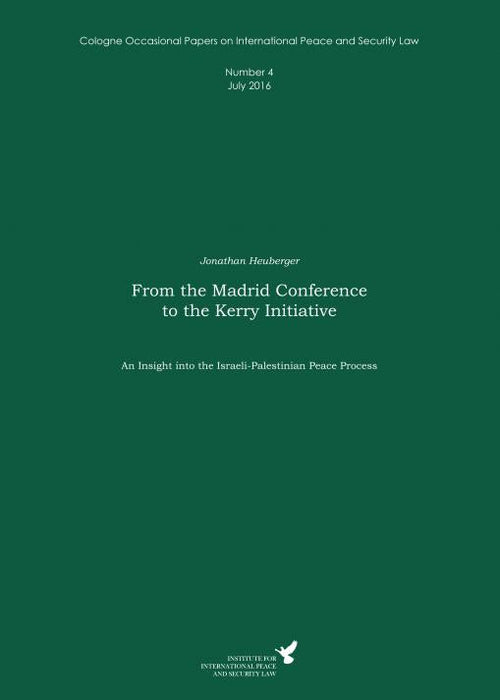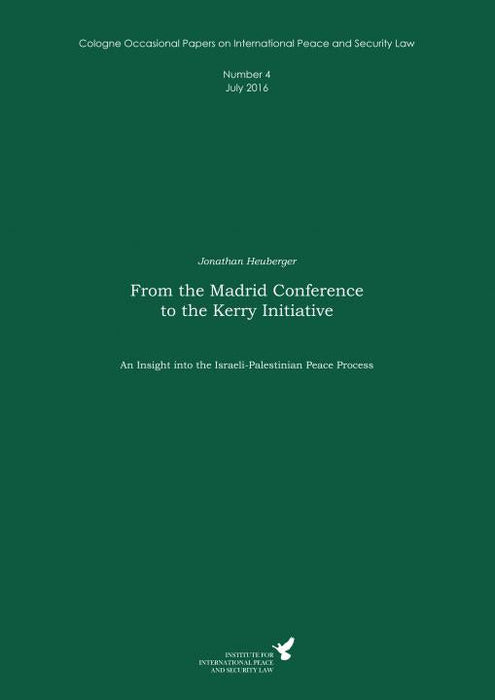Number 4 | From the Madrid Conference to the Kerry Initiative
- Brand: Prof. Dr. Claus Kreß | Cologne Occasional Papers on International Peace and Security Law
- Availability: In stock
- SKU: 9783863761844
€24,90
This essay provides a historical overview of the Israeli-Palestinian conflict and peace process. The term “Israeli-Palestinian peace process” as used hereafter describes negotiations between Israelis and Palestinians in relation to the ongoing conflict over part of the territory designated as “The Mandate of Palestine” (also known as “Mandatory Palestine”) by...
This essay provides a historical overview of the Israeli-Palestinian conflict and peace process. The term “Israeli-Palestinian peace process” as used hereafter describes negotiations between Israelis and Palestinians in relation to the ongoing conflict over part of the territory designated as “The Mandate of Palestine” (also known as “Mandatory Palestine”) by the League of Nations in 1922. This essay does not discuss the Israeli-Egyptian or Israeli-Jordanian peace agreements even though these developments foster a more comprehensive understanding of the Arab-Israeli conflict.
The Israeli-Palestinian conflict is multifaceted and complex. Israelis and Palestinians have distinct historical narratives. Thus, many of the events discussed here might offer multiple interpretations. The main objective of this essay is to provide an impartial and multi-angled introduction to the Israeli-Palestinian peace process. Part I of this essay provides a historical overview of the Israeli-Palestinian conflict. Part II summarizes the stages of Israeli-Palestinian peace negotiations and agreements in chronological order from the Madrid Conference of 1991 until the breakdown of the final status negotiations led by the United States (“U.S.”) from 2013–2014. Part III identifies what the parties have designated as the core issues of final status negotiations: borders, security arrangements, settlements, refugees and Jerusalem. This part also examines Israel's claim to be recognized by the Palestinians as Jewish State. Part IV presents pragmatic proposals to overcome the current deadlock in the peace process.
Details
- Title: From the Madrid Conference to the Kerry Initiative
- Subtitle: An Insight into the Israeli-Palestinian Peace Process
- Author: Jonathan Heuberger
- Series: Cologne Occasional Papers on International Peace and Security Law
- Edition: 1st edition
- Band: 4
- Publisher: Prof. Dr. Claus Kress
- Released: 1st edition 06/23/2016
- Subject: Law
- Product Type: Book (Hardcover)
- Product type: Technical book
- Language: English
- Binding: Softcover (paperback)
- Dimensions: 21.0 x 14.8 cm (DIN A5)
- Scope: 113 pages
- Condition: New (wrapped in foil)
- Keywords: Algiers Declaration, Annapolis Conference, Arab Revolt of 1936-1939, Balfour Declaration, Camp David, Establishment of the State of Israel, Peace Process, Gaza-Jericho Agreement, Gaza Conflict, Gaza Strip, Israel, Israeli-Palestinian Peace Process, Jerusalem, Kerry Initiative, Madrid Conference, Madrid Peace Conference, McMahon-Hussein Correspondence, Middle East peace summit, Oslo I, Oslo II, Palestine Liberation Organization, Palestinian, Taba Summit, The 1967 War, The 1973 War, UN Security Council Resolution, West Bank, West Bank
Downloads
DRM: Digital Watermark
This eBook contains a digital watermark and is therefore personalized for you. If the eBook is passed on to third parties abusively, it is possible to trace it back to the source.
File format: PDF (Portable Document Format)
With a fixed page layout, the PDF is particularly suitable for specialist books with columns, tables and figures. A PDF can be displayed on almost all devices, but is only suitable to a limited extent for small displays (smartphone, e-reader).
System requirements:
PC/Mac: You can read this eBook with a PC or Mac. You need a PDF viewer - e.g. Adobe Reader.
eReader: This eBook can be read with (almost) all eBook readers. However, it is not compatible with the Amazon Kindle.
Smartphone/Tablet: Whether Apple or Android, you can read this eBook. You need a PDF viewer - e.g. Adobe Reader.
Buying eBooks from abroad
For tax law reasons we can sell eBooks just within Germany and Switzerland. Regrettably we cannot fulfill eBook orders from other countries.



